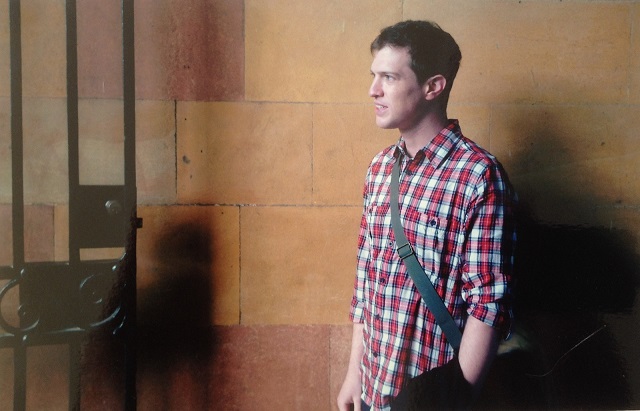Tod Greenfield Hartman, 1978 – 2016

(Dr.) Tod Hartman was a highly original, endlessly inventive anthropologist and writer, who has left us far too early.
The son of (Dr.) William T. Hartman and Mrs. Peggy L. (Greenfield) Hartman of State College, Pennsylvania, Tod was born on 8 May 1978 at Stanford, California. He graduated with honours from State College Area High school in 1996, where he was co-editor of the literary magazine. He discovered and was influenced by the novels of Vladimir Nabokov and Henry James. In 2000 he graduated from Pennsylvania State University with double Bachelor of Arts (B.A.) degrees in History and Comparative Literature, both with highest honours and received the Oswald award for student plays he had written and directed. Selected Student Marshal for the College of Liberal Arts, he led his graduating class during Commencement and delivered the address, comparing the student protests of 1968 with those occurring in 2000.
After studying at the Sorbonne in Paris during his junior year at Penn State (1998-1999), Tod matriculated at Peterhouse College, Cambridge, in September 2000 to study for an MPhil degree. He pursued a further academic year at the Sorbonne (2003-2004), studying for a D.E.A with Professor Dominique Desjeux on themes of consumerism and society. Returning to Cambridge in 2004, he started doctoral research in Social Anthropology. His thesis, supervised by Dr. Nikolai Ssorin-Chaikov, drew on the experiences of Romanian migrant workers in the greenhouses of southern Spain to explore how ‘the economy’ becomes figured as a source of constraint and agency in the new Europe. Drawing on Flaubert’s idea of the idée reçue, Tod explored how certain statements about the economy in post-accession Europe become at once received and acceptable—and also, therefore, potentially enabling. It is through the very constraint of appearing to have no other choice but to follow the state of the economy, Tod argues, that migrants advance a range of other personal projects, from architectural experimentation to the reordering of domestic relationships.
Tod was a sociable and much-loved member of his doctoral cohort. A founding member of the Political Anthropology Reading Group at Cambridge and participant in the Magic Circle Seminar in the Scott Polar Research Institute, he also tutored widely in Social Anthropology and worked for Peterhouse Library. During his doctoral research he wrote a number of influential articles; several of which continue to appear on undergraduate and postgraduate reading lists for courses on migration, post-socialism, and material culture. His 2008 essay ‘States, markets, and other unexceptional communities: informal Romanian labour in a Spanish agricultural zone’, published in the Journal of the Royal Anthropological Institute, marked a significant contribution to the anthropology of migration and informal labour, and was one of the first to point out striking similarities between state-controlled, officially-recognised labour practices and those more informal varieties that supposedly stand in direct contrast to them. His 2007 essay ‘Moral vectors, transitional time and a “utopian object of impossible fullness”’, published in Social Anthropology, was a fine-grained ethnographic account of moral ambiguities attached to outward labour migration in Northwest Transylvania, which at the same time formed a dazzling theoretical disquisition on temporality, political utopias, architecture and the idea of ‘normality’ that showcased the range and sophistication of his readings of figures as diverse as Raymond Guess, Jacques Derrida, D.H. Lawrence and Slavoj Žižek. Tod also published elegant and insightful works in Public Culture and Anthropology Matters. His article ‘On the Ikeaization of France’ was subsequently cited in The New Yorker magazine.

His writing, while always retaining an anthropological sensibility, ranged well beyond the discipline itself, running the gamut from restaurant reviews to scholarly editing. A comic short story, Dear Dear Leader — a series of letters from a student to Kim Jong-il — was included in the Granta publication NW15, The Anthology of New Writing in 2007. At the time of his death he was working on several novels, short stories, reviews and critical pieces, and an opera libretto.
Tod was a member of the Royal Anthropological Institute, the London Library, and the English National Opera, and several writers’ groups, including in North London where he moved in 2009. He was a classical pianist with a love of music and a talented linguist, speaking Romanian fluently (having spent several summers in Romania as a teenager), as well as other Romance languages.
Those who knew him learnt an immense amount from him — in particular about art, music, philosophy, and how to live life fully — and they will never forget his playfulness, creativity and gentleness, all wonderfully expressed in his dinner parties where he loved to entertain. He leaves a legacy of brilliant writing, wit, exuberance, innate kindness and warmth.

Tod Hartman at Clare College, Cambridge, 2007
JACOB COPEMAN and MADELEINE REEVES
With warm thanks to Peggy Hartman and Paul Stephenson
Bibliography
Hartman, Tod. 2007. ‘Moral vectors, transitional time and a “utopian object of impossible fullness.”’ Social Anthropology/Anthropologie Sociale 15, 2: 187–203.
———. 2007. ‘‘On the Ikeaization of France.’ Public Culture 19, 3: 483-498.
———. 2007. ‘Beyond Sontag as a reader of Lévi-Strauss: “anthropologist as hero.”’ Anthropology Matters 9, 1: 1-11.
———. 2007. ‘Dear Dear Leader’. In Bernadine Evaristo and Maggie Gee (eds.), NW15: The Anthology of New Writing: v. 15. Granta Books.
———. 2008. ‘States, markets, and other unexceptional communities: informal Romanian labour in a Spanish agricultural zone’. Journal of the Royal Anthropological Institute (N.S.) 14, 496-514.
——–. 2012. The Economy, Labour, and the New Romanian Migration to Spain. PhD dissertation, University of Cambridge.
To cite this article:
COPEMAN, JACOB and REEVES, MADELEINE. 2016. ‘Tod Hartman’. Obituaries. Royal Anthropological Institute, 31 August 2016. (available on-line: http://www.therai.org.uk/archives-and-manuscripts/obituaries/tod-hartman).
Link to relevant records by or concerning the listed person on the RAI’s bibliographic database Anthropological Index Online https://aio.therai.org.uk/aio.php?action=doquicksearch&qs_resultsmode=fullkeywords&qs_decades=all&qs_keyword=Tod%20Hartman
